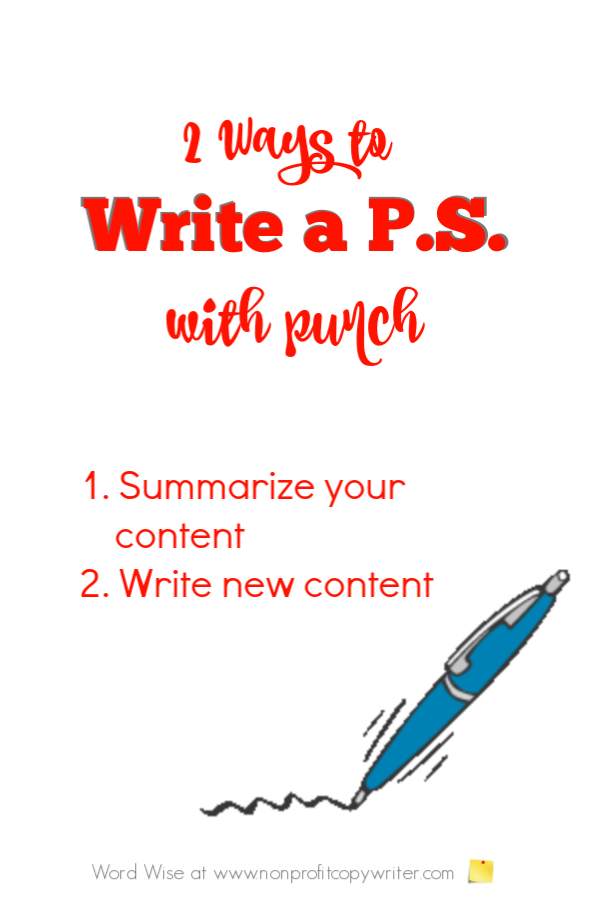Save Time: Get 5 Simple Writing Tips
you can put to use in 10 minutes
Tips for Writing a PS With Punch
Award-winning writer Kathy Widenhouse has helped hundreds of nonprofits and writers produce successful content , with 750K+ views for her writing tutorials. She is the author of 9 books. See more of Kathy’s content here.
Updated 2.1.25
Should you include a PS (a postscript) as part of your project – and if so, how should you write it?
Way back when people wrote letters without access to Wite Out, erasers, or the Delete key, a postscript was a handy way to add a piece of news or a tidbit at the bottom of the letter without rewriting the whole thing. The origins of the Latin name post scriptum, meaning “written after,” explain it all.
Fast forward to today when the postscript has morphed into more than an afterthought. It is a full-blown, persuasive writing tool you can use to add information or emphasize your point.
Two Ways to Write a P.S.
Today’s readers are pressed for time, so they conduct a quick skim of a letter before deciding to read the whole thing: the letter’s salutation first (they want to see their name), then the signature (“who is writing to me?”), and then the postscript.
All this before they get to the body of the letter or post or article or email.
In other words, the postscript “is the first paragraph, not the last,” according to direct mail guru Siegfried Vogele. It occupies valuable real estate.
Since such content is a premium, how should you write it? There are two schools of thought.
Option 1. Summarize your content and repeat your call to action
In this approach, you distill your content to a quick-and-dirty version of your offer. It’s easy, but it’s mere repetition and a missed opportunity with an added danger: you’ll bore your reader if she reads the entire letter.
Option 2. Write new content and a fresh call to action
This approach creates an intriguing first impression (remember, the postscript is “the first paragraph”) with an additional benefit, irresistible fact, fresh detail, compelling testimonial, deadline or time limit, extra deal, or a guarantee to pull in your reader. She may even want to go back and read the entire letter. The strengths to this approach are that you capture the reader’s attention, give her additional information, and respect her time. The danger? I haven’t found any, unless you count that it takes a little bit of effort.
I’m a fan of Option 2. It works better and it shows respect for your reader. But notice what both options have in common: a call to action. Got to have that, regardless.
Can You Overdo It?
How long your P.S. should be? As the “first paragraph” that the reader reads, it’s a short one – usually a sentence or two. Let proportionality reign. If your piece is long, your postscript can be longer, too.
And what about using a P.P.S. (“post postscript”)? Sure – if it adds another fresh approach to your call to action.
PS: It’s Not Just for Letters
Appeal letters or sales letters or business letters don’t have the sole market on this element. Use one on a blog post, an email, at the end of an article … or even at the end of a web page. (GRIN).
Because what’s the point of a postscript? To emphasize your point.
More Letter Writing Tips
Beyond Yours Truly: Business Letter Closings That Mark You as a Pro ...
The basics about writing letters ...
30 Kinds of Letters You Need to Know How to Write ...
Basic letter writing format: 4 standard layouts ...
How to Write a Cover Letter: FAQs ...
Top Cover Letter Writing tTp ...
Free Cover Letter Writing Guide: Download Yours ...
Letter writing tip: try this great opening line ..
Call to action: have you told your reader what to do?
5 things your appeal letter MUST have ...
How to Write a Christmas Letter (that people want to read) ...
More letter writing tips on our Pinterest board ...
Return from Tips for Writing a PS to Nonprofit Copywriter home
As an Amazon Associate I earn from qualifying purchases.
Share This Page

Named to 2022 Writer's Digest list
BEST GENRE/NICHE WRITING WEBSITE


Stop Wasting Time!
Grab your exclusive FREE guide, "5 Simple Writing Tips You Can Put to Use in 10 Minutes or Less"












